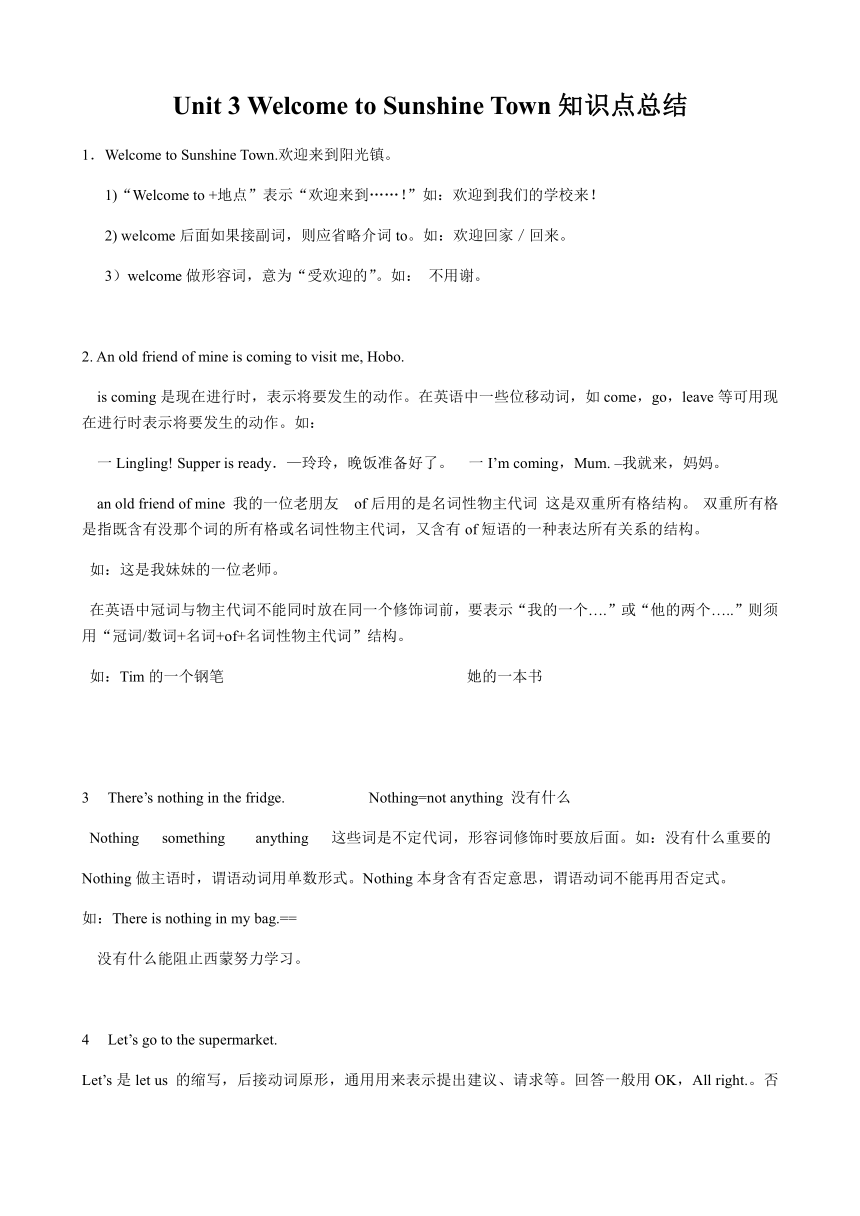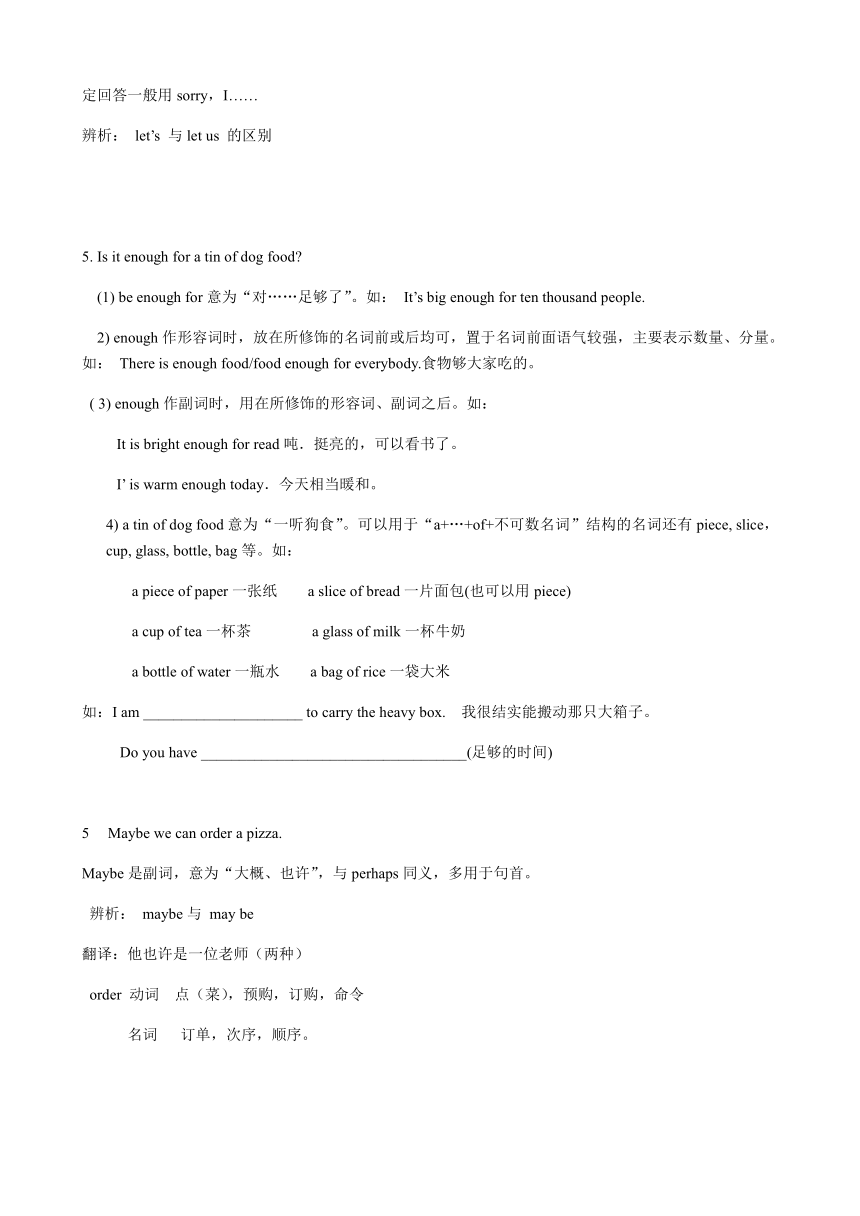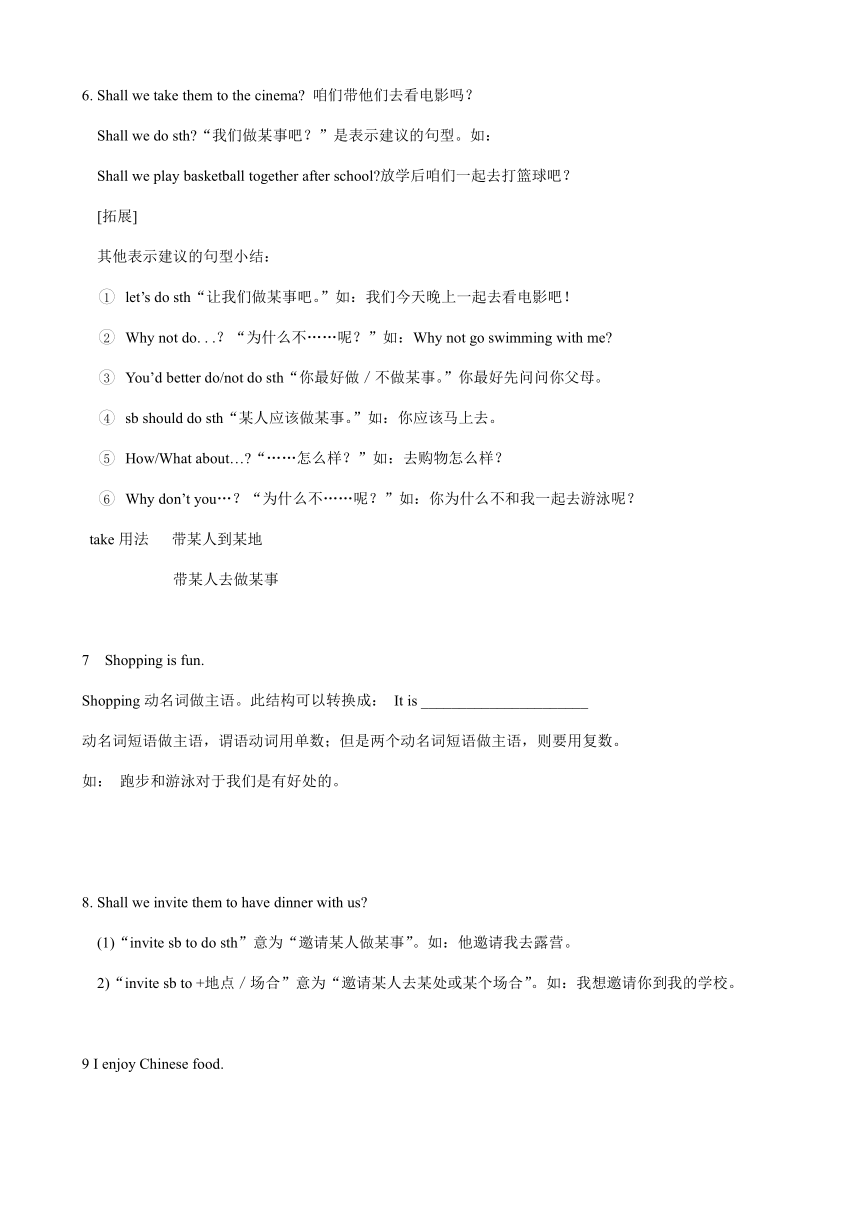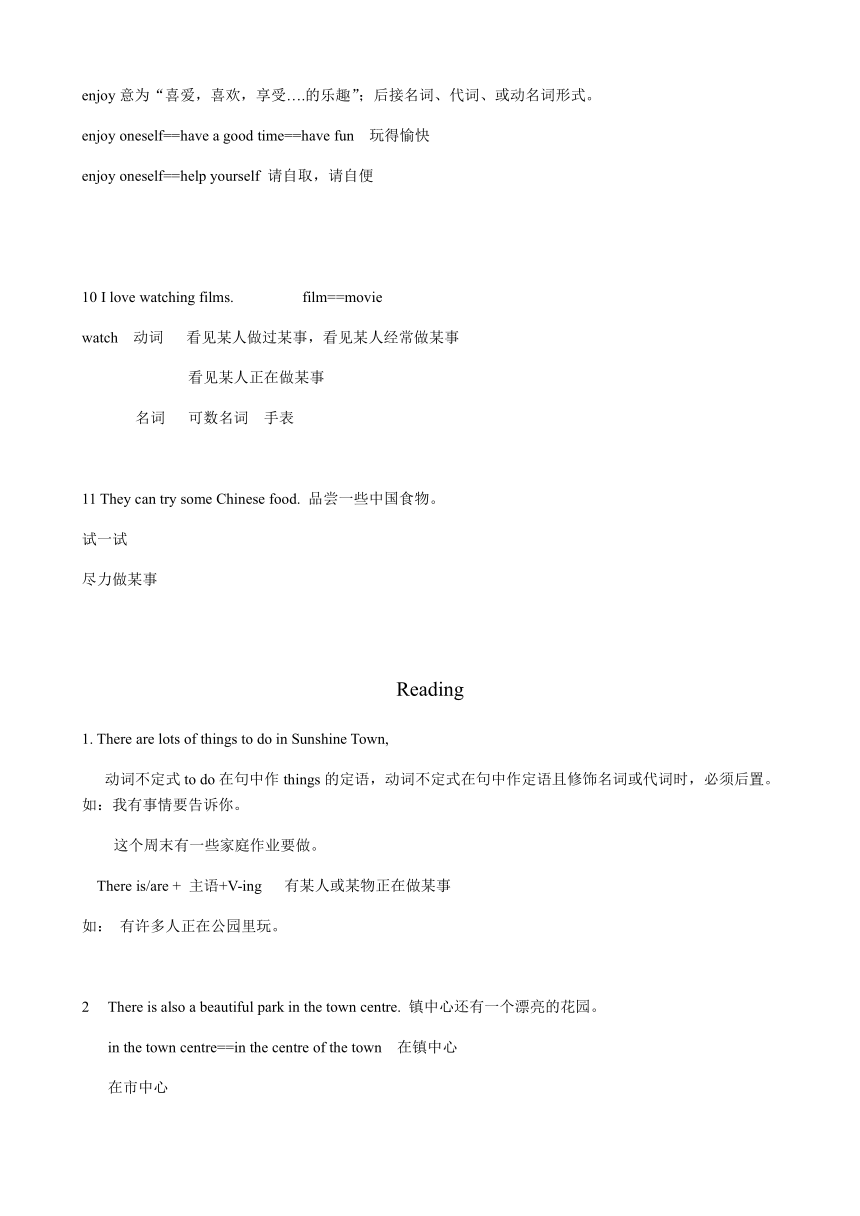牛津译林版英语七年级下 Unit 3 Welcome to Sunshine Town知识点梳理+练习(无答案)
文档属性
| 名称 | 牛津译林版英语七年级下 Unit 3 Welcome to Sunshine Town知识点梳理+练习(无答案) |

|
|
| 格式 | zip | ||
| 文件大小 | 78.5KB | ||
| 资源类型 | 教案 | ||
| 版本资源 | 牛津译林版 | ||
| 科目 | 英语 | ||
| 更新时间 | 2020-03-01 00:00:00 | ||
图片预览





文档简介
Unit 3 Welcome to Sunshine Town知识点总结
1.Welcome to Sunshine Town.欢迎来到阳光镇。
1)“Welcome to +地点”表示“欢迎来到……!”如:欢迎到我们的学校来!
2) welcome后面如果接副词,则应省略介词to。如:欢迎回家/回来。
3)welcome做形容词,意为“受欢迎的”。如: 不用谢。
2. An old friend of mine is coming to visit me, Hobo.
is coming是现在进行时,表示将要发生的动作。在英语中一些位移动词,如come,go,leave等可用现在进行时表示将要发生的动作。如:
一Lingling! Supper is ready.—玲玲,晚饭准备好了。 一I’m coming,Mum. –我就来,妈妈。
an old friend of mine 我的一位老朋友 of后用的是名词性物主代词 这是双重所有格结构。 双重所有格是指既含有没那个词的所有格或名词性物主代词,又含有of短语的一种表达所有关系的结构。
如:这是我妹妹的一位老师。
在英语中冠词与物主代词不能同时放在同一个修饰词前,要表示“我的一个….”或“他的两个…..”则须用“冠词/数词+名词+of+名词性物主代词”结构。
如:Tim的一个钢笔 她的一本书
3 There’s nothing in the fridge. Nothing=not anything 没有什么
Nothing something anything 这些词是不定代词,形容词修饰时要放后面。如:没有什么重要的
Nothing做主语时,谓语动词用单数形式。Nothing本身含有否定意思,谓语动词不能再用否定式。
如:There is nothing in my bag.==
没有什么能阻止西蒙努力学习。
4 Let’s go to the supermarket.
Let’s是let us 的缩写,后接动词原形,通用用来表示提出建议、请求等。回答一般用OK,All right.。否定回答一般用sorry,I……
辨析: let’s 与let us 的区别
5. Is it enough for a tin of dog food?
(1) be enough for意为“对……足够了”。如: It’s big enough for ten thousand people.
2) enough作形容词时,放在所修饰的名词前或后均可,置于名词前面语气较强,主要表示数量、分量。如: There is enough food/food enough for everybody.食物够大家吃的。
( 3) enough作副词时,用在所修饰的形容词、副词之后。如:
It is bright enough for read吨.挺亮的,可以看书了。
I’ is warm enough today.今天相当暖和。
4) a tin of dog food意为“一听狗食”。可以用于“a+…+of+不可数名词”结构的名词还有piece, slice,cup, glass, bottle, bag等。如:
a piece of paper一张纸 a slice of bread一片面包(也可以用piece)
a cup of tea一杯茶 a glass of milk一杯牛奶
a bottle of water一瓶水 a bag of rice一袋大米
如:I am _____________________ to carry the heavy box. 我很结实能搬动那只大箱子。
Do you have ___________________________________(足够的时间)
5 Maybe we can order a pizza.
Maybe是副词,意为“大概、也许”,与perhaps同义,多用于句首。
辨析: maybe与 may be
翻译:他也许是一位老师(两种)
order 动词 点(菜),预购,订购,命令
名词 订单,次序,顺序。
6. Shall we take them to the cinema? 咱们带他们去看电影吗?
Shall we do sth?“我们做某事吧?”是表示建议的句型。如:
Shall we play basketball together after school?放学后咱们一起去打篮球吧?
[拓展]
其他表示建议的句型小结:
1 let’s do sth“让我们做某事吧。”如:我们今天晚上一起去看电影吧!
2 Why not do. . .?“为什么不……呢?”如:Why not go swimming with me?
3 You’d better do/not do sth“你最好做/不做某事。”你最好先问问你父母。
4 sb should do sth“某人应该做某事。”如:你应该马上去。
5 How/What about…?“……怎么样?”如:去购物怎么样?
6 Why don’t you…?“为什么不……呢?”如:你为什么不和我一起去游泳呢?
take用法 带某人到某地
带某人去做某事
7 Shopping is fun.
Shopping动名词做主语。此结构可以转换成: It is ______________________
动名词短语做主语,谓语动词用单数;但是两个动名词短语做主语,则要用复数。
如: 跑步和游泳对于我们是有好处的。
8. Shall we invite them to have dinner with us?
(1)“invite sb to do sth”意为“邀请某人做某事”。如:他邀请我去露营。
2)“invite sb to +地点/场合”意为“邀请某人去某处或某个场合”。如:我想邀请你到我的学校。
9 I enjoy Chinese food.
enjoy意为“喜爱,喜欢,享受….的乐趣”;后接名词、代词、或动名词形式。
enjoy oneself==have a good time==have fun 玩得愉快
enjoy oneself==help yourself 请自取,请自便
10 I love watching films. film==movie
watch 动词 看见某人做过某事,看见某人经常做某事
看见某人正在做某事
名词 可数名词 手表
11 They can try some Chinese food. 品尝一些中国食物。
试一试
尽力做某事
Reading
1. There are lots of things to do in Sunshine Town,
动词不定式to do在句中作things的定语,动词不定式在句中作定语且修饰名词或代词时,必须后置。如:我有事情要告诉你。
这个周末有一些家庭作业要做。
There is/are + 主语+V-ing 有某人或某物正在做某事
如: 有许多人正在公园里玩。
2 There is also a beautiful park in the town centre. 镇中心还有一个漂亮的花园。
in the town centre==in the centre of the town 在镇中心
在市中心
3 It takes only 40 minutes by underground.乘地铁只需要40分钟。
是一个省略句,补全应是
It takes +( sb) some time + to do sth是英语上一重要句型,意“做某事需要花多少时间”。
另一种表达: sb spend(s) +some time+ doing sth
如:从我家开车去南京大约要两个小时。
对40 minutes提问,用
对40 minutes by underground提问,用
4 Sunshine Town is not far from the centre of Beijing.
far和away后都可接from, far from…..表示“离。。。。很远”的意思,常用于否定句中。
如:这家工厂离他家不远。
away from ……. 前通常会加具体的距离,表示“离….具体多远”,此时不能与far不能同时使用。
如:它离这儿有一万米远。
有时away from 。。。。。前会加far,即far away from 表示“离。。。。很远”,与far from 意思相近,但它常用于肯定句中。
如: 那所学校离这儿远。
4 Most things are not expensive.
expensive与cheap表示东西、货物的贵贱。high与low表示价格的高低。
most (1)副词,意为“十分,很”,如:他很喜欢打篮球。
(2)代词,表示“大多数”,后接表示范围的of构成短语,谓语动词根据of后面的名词来决定。
如:大多数的交换生来自美国。
(3)most还是many和much的最高级形式,与the连用,表示“最多”。
如: 我的书最多。
5.Beijing duck is very famous.北京烤鸭很有名。
famous作形容词,意为“著名的,出名的”。如:The place is famous for its oil.该地以盛产石油著称。
[拓展] famous的搭配:
① be famous for表示“以……而闻名/著称”,表示某人以某种知识、技能、作品或征而出名,相当于be well known for。如:中国以它的瓷器而出名。
②be famous as意为“作为……而著名”。如: 朗朗作为杰出的钢琴家而出名。
6 If you do not like Chinese food,there are some estern restaurants too.如你不喜欢中餐,也有一些西餐馆。
句是一个含有if条件状语从句的复合句,主句为here are some Western restaurants too,从句为 if you do not like Chinese food。
注意:在if引导的条件状语从句中,如果主句是将来态或含情态动词的句子,则从句要使用一般现在时。如:
if还可表示成“是否”,如:我不知道他明天是否会来。
6 If you want to learn more about Chinese art , don’t miss the opera shows there.
learn: 向某人学习 学到很多 互相学习
miss 动词,意为(1)“错过、未看到、未赶上”,后接名词、代词或动名词。
(2)“想念、思念、留恋”, 后接名词、代词或动名词
失之毫厘,谬以千里。
7 We are looking forward to meeting you soon.
look forward to意为“期待;期望”,后跟名词、代词或词的-ing形式,表示说话者十分希望实现某种愿望、目的。如:
All the children look forward to the Spring Festival.所有的孩子都盼望过春节。
I’m looking forward to seeing you soon.我盼望早日见到你。
1.There’s no dog food .(用not改写)There dog food .
2.We have only one yuan .(对划线部分提问) do you have ?
3.We can buy 3 tins of dog food with 20 yuan . (对划线部分提问)
Of dog food with 20 yuan ?
4.Maybe there is a football match between Class A and Class B . (改为同义句)
There a football match between Class A and Class B .
用所给词的适当形式填空
1.There are lots of things (do) in Sunshine Town.
2.Why not (try) the food in this new restaurant ?
6.If she doesn’t finish her homework on time , her teacher will let her (stand) outside the classroom .
1. The people in the northern part of China used to make fires ________ (keep) warm.
2. Nearly everyone _________ (know) him well in the small town. He’s very popular.
3. Look! How fast Lily ___________ (run)! I’m sure she’ll come first.
4. If you ___________ (not be) interested in sports, we can take you to the cinema.
5. I want you _________ (tell) us the life in your hometown in England.
6. What about ___________ (go) shopping at weekends, Susan?
7. My parents are looking forward to __________ (meet) you soon.
8. ----Shall we invite Jim ___________ (join) us in the party this Sunday? ----Good idea!
9. Does your mother enjoy ___________(drink) coffee at breakfast?
1. If you___________(not like) sports, we can go to a museum instead.
2. I spend half of my pocket money__________(buy) some DVDs of Japanese cartoons.
3. What size of shirt do you need___________(try) on, Size M or Size L?
4. Who can teach the exchange students_____________(sing) Beijing Opera?
3. Tom has to _________(get) up early every day because he lives far from school.
4. There ____________(be not) much air pollution in our city now
5. They invite three of ________(we) to their party.
6. My grandma____________(come)tomorrow.
7. I spend much time __________(do) my homework every day.
8. It took me two hours __________(work) out the maths problem.
1. Each of my classmates_______(have) a computer at home.
2. Millie with her friends ________(go) to the Reading Club twice a week.
3. Look! A woman with long hair _________(run) after our pet dog.
4. I am sure he ______(not play) computer games any more.
5. There ______(be) an English evening party tomorrow, isn’t there?
6. Would you please ________(not turn) off the light? I’m reading something interesting.
( ) 5. _________ she isn’t at home. She ________ go to Beijing.
A. May, maybe B. Maybe, maybe C. Maybe, may D. Maybe, not
( ) 3. My father is going to take me _________ the park.
A. to B. for C. at D. on
(? ???) 1.?—_______?your?school from your home????
—It takes about twenty minutes to go to school from my home by bike.?
A.?How long B.?How soon C.?How far D.?How often
(??? ?) 3.?—Where do you live, Mary?
— I live in Nanjing Street. My house is?_____?a big supermarket.?
A.?next to B.?next C.?fat? D.?far away
(??? ?) 4.?Millie is a good swimmer, and she can swim ________ a fish.?
A.?likes B.?is like C.?liked D.?like
(???? ) 5.—Ben, would you like to play football with us?
—?_________, but I have to wash the dishes first.?
A.?No, I can’t B.?I don’t want to C.?Yes, I’d love D.??I’d love to
( ????) 6.?—May I take _______?food for my supper??
—Sure. You can take _______ food you like here.
???? A.?any; some B.?some; any C.?any; no? D.?some; no?
(?? ??) 7. It’s not far. You can go there _____ a bike. You needn’t go there ______ a car.
A.?on;?in B.?by; by C?on;?on? D.?by; in?
(?? ??) 8.?It’s ___________ walk from my home to the park.?????
A.?10 minutes B.?10 minute’s C. 10-minute’s D.?10 minutes’
Grammar
名词所有格的构成及用法
名词在句中表示所有关系、所属关系、动作执行者及动作承受者等意义时常需用所有格形式。名词所有格也称为属格、主格,它主要包括's所有格、of所有格和双重所有格三种表现形式。
定义:表示有生命的东西的名词及某些表示时间、距离、星球、世界、国家等无生命的东西的名词后加 ’s来表示所有关系,叫做名词所有格。
名词所有格的用法:
一、名词+ ’s (主要用于有生命的事物)
1、单数名词和不以-s结尾的复数名词在词尾加’s构成所有格
例如:Jimmy’s book(吉米的书)Jane’s schoolbag(简的书包)
Children’s Day(儿童的节日、六一儿童节) Wuhan’s summer is very hot.(武汉的夏天非常热。)
2、复数名词以-s结尾的只需要加’ 构成所有格。
例如:Twins’ father is Mr. Brown. (双胞胎的爸爸是布朗先生。)
二、名词 +of +名词
如果名词是无生命的,我们通常就要用名词+of +名词的结构来表示所有关系。
例如:A bag of mine= my bag (我的书包) The name of the girl =the girl’s name (女孩的名字)
The window of the bedroom = the bedroom’s window(卧室的窗户)
三、特殊所有格
若一样东西为两人共有,则后一个人名用所有格;如果不是两人共有,而是各有各的,则两个名词都用所有格,且其后名词应为复数。
例如:This is Tom and Jim’s room. 这是汤姆和吉姆共有的房间。
These are Tom’s and Jim’s rooms. 这些是汤姆和杰森各自的房间。
步行一个半小时的路程:
四.'s所有格所修饰的词的省略现象
(1)表示诊所、店铺或某人的家等地点名词,其名词所有格后的被修饰语常常省略。
例如: I met her at the doctor's(office).我在诊所遇见了她。
He has gone to the tailor's(shop).他到服装店去了。
(2)名词所有格所修饰的词,如果前面已经提到过,往往可以省略,以免重复。例如:
Whose pen is this?It's Tom's.这是谁的钢笔?是汤姆的。
The bike is not mine,but Wang Pinpin's.这辆自行车不是我的,是王品品的。
5. 双重所有格及其用法
's所有格和of所有格两种所有格形式结合在一起,构成"of+所有格"形式,即双重的所有格。它通常表示部分观念,即全体中的一部分,在意义上与"one of..."相似,它主要修饰of短语之前的那个名词。此外,双重所有格与指示代词连用时,常带有感彩,如赞赏、不满、厌恶等。它的主要形式如下:
1. 名词+of+名词性物主代词。例如:
a good friend of mine 我的一个好朋友 an interesting story of his 他的有趣的经历
2. 名词+of+'s所有格。例如:
He is a friend of my sister's.(=one of my sister's friends)他是我姐姐的一个朋友
Look at that long nose of Jack's.看杰克的那个长鼻子。(感彩)
试比较:
a picture of Xiao Zhang
a picture of Xiao Zhang's
3. 不定冠词、数词、某些不定代词(some,any,many,no,few等)以及which等限定词,一般不与形容词性物主代词或's所有格等一起放在名词前修饰名词,而采用of所有格或双重所有格形式。例如:
most of the students 学生中的大多数 three of them 他们中的三个人
I have read some books of his.我读过他的一些书
Which book of Qiong Yao's have you read?你读过琼瑶的哪一本书?
A. 's所有格、of所有格和双重所有格三者之间的细微区别
请仔细比较下面三句话:
1. She is Mary's brother's friend.
2. She is a friend of Mary's brother.
3. She is a friend of Mary's brother's.
人称代词和物主代词
1、 人称代词
人称 单数 复数
主格 宾格 主格 宾格
第一人称 I me we us
第二人称 you you you you
第三人称 he him they them
she her
it it
人称代词主格:作主语,表示谁怎么样了、干什么了。I am a teacher. You are student.He is a student, too. We/You/They are students.人称代词宾格作宾语,表示动作行为的对象,一般放在动词后面。Give it to me. Let’s go (let’s =let us)
二、物主代词
数 人称类别 单数 复数
第一人称 第二人称 第三人称 第一人称 第二人称 第三人称
形容词性物主代词 my your his her its our your their
名词性物主代词 mine yours his hers its ours yours theirs
形容词性物主代词(my/your/his/her/its/our/their)+名词
而名词性物主代词(mine/yours/his/hers/its/ours/theirs则相单于形容词性物主代词+名词,故其后不必加名词。如:
Is this your book? No, it isn’t, it’s hers(her book) ,Jim’s , Tom’s, Maria’s
练习
一、用适当的人称代词填空:
1.?__________?is?my?aunt.?We?often?visit?__________. ( she )
2.? China?is?a?developing?country.?_________is?in?the?east?of?Asia. ( its )
3. I?own?a?blue?bike.?The?red?one?isn’t?__________. ( I )
4.?These?new?houses?are?so?nice.?__________?are?very?expensive.( them )
5.?The?fishermen?caught?a?lot?of?fish,?didn’t?__________? ( them )
6.?Ling?Ling?is?a?girl.?____?studies?in?a?primary?school.?______?brother?lives?with?____??and?helps?____?with______ lessons. ( she )
7.?Mike?is?my?classmate.?____?is?good?at?English?. ( his )
8.?Kate?wants?a?glass?of?milk.?Will?you?pass?it?to?____?? ( she )
9.?What’s?the?weather?like?today???____?is?cloudy. ( its )
二、用形容词性物主代词和名词性物主代词填空?
1.?I?ate?all?____?sandwiches?yesterday.( I )?Can?I?have?one?of?____?? ( you )
2.?George?has?lost?____ ( his )?pen.?Ask?Mary?if(是否)she?will?lend?him?____?. ( she )
3.?Jack?has?a?dog?and?so?have?I.?____?( he ) dog?and?____ ( I )?had?a?fight?(打架).
4.?The?teacher?wants?you?to?return?that?book?of?____?( he )
5.?Mr.?and?Mrs.?Green?and?a?friend?of?____?are?coming?to?see?us. ( they )
6.?We?are?going?to?Paris?to?stay?with?a?French?friend?of?____?. (we )
三、用括号中的适当形式填空
1.Are?these?________(you)pencils? Yes,?they?are?________(our).
2.—Whose?is?this?pencil? —It’s?________(I).
3.I?love?________(they)very?much.
4.She?is________(I)classmate.
5.Miss?Li?often?looks?after________(she)brother.
6.—Are?these?________(they)bags??
—No,?they?aren’t?________(their).?They?are?________(we)
1 Neil’s mother is calling him from the UK.
Call 动词 叫,呼唤 例: 马上叫个医生来。
称……为 例:他的朋友叫他鲍勃。
名词 打电话,通话 例:Tim,有你的电话
2 Mr Wu is asking Amy which things belong to which people.
belong to 意为“属于……”,后接某人或人称代词宾格。如:
This key ring belongs to me. 这个钥匙圈是我的。
注意:belong to 后不能使用名词所有格或物主代词,且belong to不可用于进行时。
如:这车属于她。
3 They’re all over the place. all over 遍及
遍及全中国 遍及全世界
瞧。大厅里到处都是瓶子。
Integrated skills
1 Here is the poster.
以here开头的句子,如果主语是名词,则用倒装语序,连系动词是用is还是are取决于后面的名词是单数还是复数。例:有张卡片给你。
注意:当主语是代词时,不用倒装语序。
Here they come. 他们来了; here it is 它在这里; here you are 给你
2 Go to Huangji Palace to see works of art at 11 a.m.
Works of art 艺术品
Work 作品,著作 可数名词 工作、劳动 不可数名词(与job)
4 It’s about 40 minutes by bus.
It is +所需时间+(from S to B )by +交通工具/on foot 表示“(从A地到B地)距离”句型。
也可表示成: It is +所需时间名词的所有格+walk/ride/drive (+from A to B)
例: 从苏州到南京开车大约两个小时。(两种方式)
Study skills
1 However, the words are not equally important. 然而,单词并不都同等重要。
However副词,不过,然而 有转折的含义 可位于句首、句中或句末,用逗号将句子分隔。
But连词,可位于句首、句中, 后面连接一个句子时无需逗号。
例: 我的房间虽小,但是很舒服。
2 I am talking about a bookshop , not another kind of shop.
Another 另一个,再一个 后接可数名词单数,通常指用于三者或三者以上人或物中的另一个。
区分 other, the other, others, the others, another
other
the other
others
the others
another
例如:——Oh, the traffic is so heavy. ———Let’s change _______ route to the airport.
A other B others C the other D another
Task
1 I’m going to show you around my hometown.
show sb around 带领某人参观
show 及物动词 给….看 给某人看某物
名词 展览 展出 花展
例 Peter will _____ you _____ the building and you can meet everyone.
A lead to B show around C compare with D brush off
2 can smell the flowers and hear the birds. 我可以闻花香听鸟儿唱歌。
(1)smell 动词,意为“闻;嗅”,后接名词作宾语。如:
Smell it and tell me what it is. 你闻闻看,告诉我是什么。
(2)smell 还可以用连系动词,后常接形容词作表语。如:
Do these flowed smell sweet? 这花闻起来香吗?
(3)hear sb do sth 意为“听见某人做某事”。如:
I often hear her sing in the room. 我经常听见她在房间唱歌。
(4)hear sb doing 意为“听见某人在做(一个正在进行的动作)”。如:
I heard someone laughing in the room. 我听见隔壁房间里有人在笑。
除hear外,see、watch、feel、notice 等动词也有同样的用法。
例: The air ____ fresh after the rain. And the sky is blue.
A feels B tastes C smells D sounds
3 Sometimes we row a boat there.
Sometimes 副词 有时 == at times
区分 sometimes、 some times、 sometime、 some time
sometimes
some times
sometime
some time
5 They are all friendly.
friendly 形容词 友好的 对某人友好be friendly to sb. ===be kind to sb
be friendly with sb “和某人关系好”或“某人要好”,指的是两者的关系
6 I hope you can come and visit soon!
Hope及物动词 希望,用于表示可能实现的愿望,其后接动词不定式做宾语,即hope to do sth ,表示希望做某事。 若要表达“希望…….”, 则需要用“hope that +从句”
wish也是希望、祝愿的意思。
wish 做动词 祝愿某人某事 wish sb sth ;
希望(某人)做某事wish (sb) to do sth ;
表示难以实现的愿望 wish that + 从句 。
做名词 常用复数,表示祝愿。 向你致以美好的祝愿!
根据句意及相关提示写出正确的单词
1. Some farmers in my town r___________ cows and make a lot of money.
2. –What do you think of the cake? --It s___________ good.
3. How fast he is d___________ the car! It’s so dangerous.
4. On ___________(woman) Day, my mother often goes shopping with her friends.
5. We must learn to read our books ____________(quiet) in the library.
6. I often go to the shopping mall with my parents __________ (two) a week.
7. These ___________ (student) hometown is near the capital of _________ (they) country.
8. The girl in a white dress is a friend of _________ (he).
用括号中所给词的正确形式填空
1.. Mr Li teaches _____________(I) English.
2. Mr Li teaches ______________(I) sister English.
3. __________(they) are our teachers. Where are __________(you)?
4.Her shoes are next to __________(I). ___________(she) are very nice.
5.______________(Simon) father is good at English.
6.---Where is Mike? ----He is in our Maths____________(teacher) office.
7.My favourite festival is________________(child) Day.
8.Excuse me, but I can’t find ____________(man) room.
9.Can you tell me the way to_________________(people) Park?
10.I will tell ______________as soon as ____________(he) comes back.
11.____________loves ___________(she) notebook very much.
12.We want to borrow_______________storybook from______________(you).
1.It takes about twenty minutes______________(get) to the center of the town.
2.Why not____________(visit) our local theatre with us?
3.We’re happy___________(invite) you to a farewell party for our friends.
4.Does your brother enjoy____________(eat) Chinese food?
5.---________you__________(try) to learn Beijing opera?-----Yes, I am.
6.What will you do when you_____________(be) free tomorrow?
7.There ___________(be) a new bridge over the Changjiang River in several years.
1. Listen, someone_________(sing) Beijing opera in the park.
2. ---_______they_______(have) a Christmas party next week? ---Yes, they are.
3. Our school________(plan) a trip every term. This term we_______(go) to Suzhou.
4. Who would like to teach us_________(ride) a horse in the summer camp.
5. If Frank__________(not come) tomorrow, we_________(have) to ask someone else for help.
6. Does your mother make you__________(play) the piano for a long time every day?
7. How lond does it take them___________(drive) to the park?
1. I don’t know which Chinese restaurant ______________ (choose).
2. March ___________ (come) before April. Everybody ___________ (know) that.
3. Please don’t drink or eat when ___________ (take) the underground.
4. How many cinemas are there in the town? It’s hard ____________ (say).
5. How long does it take ___________ (fly) to Beijing from Wuxi?
6. If Frank _________ (not come) tomorrow, we _________ (have) to ask someone else for help.
1. I think it’s a wonderful place _________________(visit).
2. Would you please _________________(not talk)with the old people loudly ?
3. I have a lot homework ____________________(do).
4. It’s so sunny, I think it________________(not rain).
5. I often hear the birds _______________(sing) in the tree.
